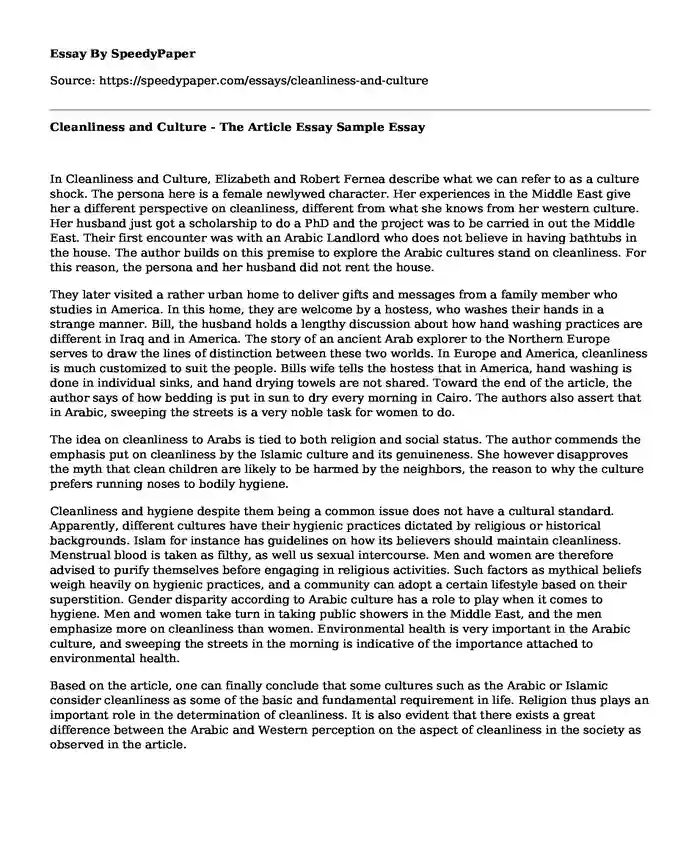In Cleanliness and Culture, Elizabeth and Robert Fernea describe what we can refer to as a culture shock. The persona here is a female newlywed character. Her experiences in the Middle East give her a different perspective on cleanliness, different from what she knows from her western culture. Her husband just got a scholarship to do a PhD and the project was to be carried in out the Middle East. Their first encounter was with an Arabic Landlord who does not believe in having bathtubs in the house. The author builds on this premise to explore the Arabic cultures stand on cleanliness. For this reason, the persona and her husband did not rent the house.
They later visited a rather urban home to deliver gifts and messages from a family member who studies in America. In this home, they are welcome by a hostess, who washes their hands in a strange manner. Bill, the husband holds a lengthy discussion about how hand washing practices are different in Iraq and in America. The story of an ancient Arab explorer to the Northern Europe serves to draw the lines of distinction between these two worlds. In Europe and America, cleanliness is much customized to suit the people. Bills wife tells the hostess that in America, hand washing is done in individual sinks, and hand drying towels are not shared. Toward the end of the article, the author says of how bedding is put in sun to dry every morning in Cairo. The authors also assert that in Arabic, sweeping the streets is a very noble task for women to do.
The idea on cleanliness to Arabs is tied to both religion and social status. The author commends the emphasis put on cleanliness by the Islamic culture and its genuineness. She however disapproves the myth that clean children are likely to be harmed by the neighbors, the reason to why the culture prefers running noses to bodily hygiene.
Cleanliness and hygiene despite them being a common issue does not have a cultural standard. Apparently, different cultures have their hygienic practices dictated by religious or historical backgrounds. Islam for instance has guidelines on how its believers should maintain cleanliness. Menstrual blood is taken as filthy, as well us sexual intercourse. Men and women are therefore advised to purify themselves before engaging in religious activities. Such factors as mythical beliefs weigh heavily on hygienic practices, and a community can adopt a certain lifestyle based on their superstition. Gender disparity according to Arabic culture has a role to play when it comes to hygiene. Men and women take turn in taking public showers in the Middle East, and the men emphasize more on cleanliness than women. Environmental health is very important in the Arabic culture, and sweeping the streets in the morning is indicative of the importance attached to environmental health.
Based on the article, one can finally conclude that some cultures such as the Arabic or Islamic consider cleanliness as some of the basic and fundamental requirement in life. Religion thus plays an important role in the determination of cleanliness. It is also evident that there exists a great difference between the Arabic and Western perception on the aspect of cleanliness in the society as observed in the article.
Cite this page
Cleanliness and Culture - The Article Essay Sample. (2020, Nov 26). Retrieved from https://speedypaper.net/essays/cleanliness-and-culture
Request Removal
If you are the original author of this essay and no longer wish to have it published on the SpeedyPaper website, please click below to request its removal:
- Impact on Government, Law School Essay Example
- Free Paper Sample on Sexual Assault and Substance Abuse Issues Within the Military
- Dead Poets Society - Movie Essay Sample
- Philosophy Essay Example: Socrates in Crito, Virtue, Philosophical Meaning of Objective and Subjective
- Free Essay on Cinematic Invisibility in the Film, "Brokeback Mountain"
- Free Essay Analyzing the Article on Sleeping Pills
- Essay Example: Professional Wrestling and The Impact it Plays in The Media
Popular categories





